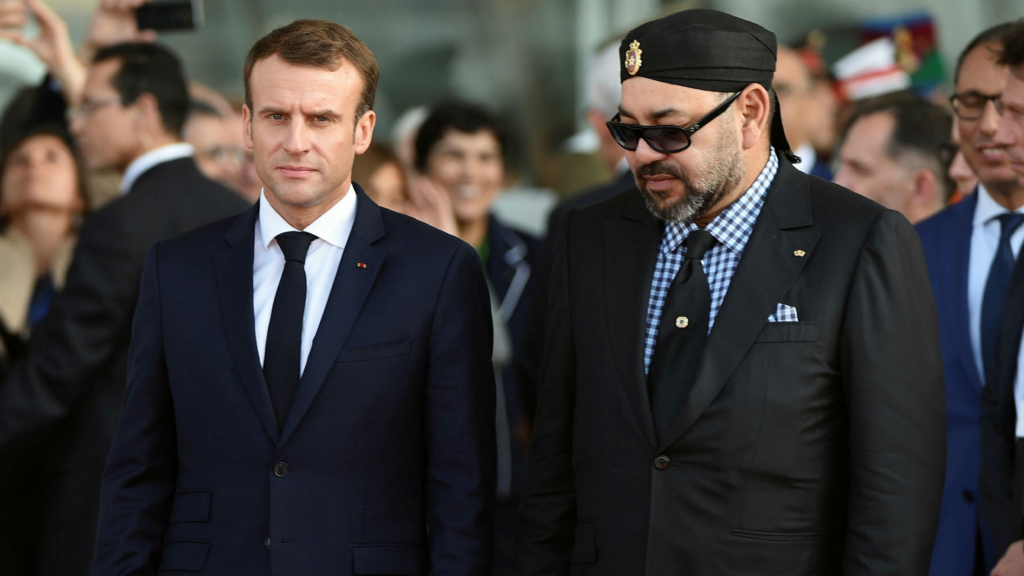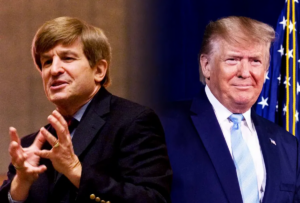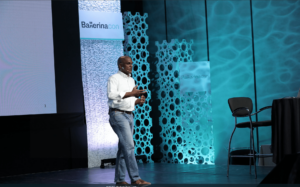Macron Blames Unnamed Groups for Morocco-France Tensions

Macron claimed that the scandals in the European Parliament as well as other issues derailing the Rabat-Paris relations aren’t France’s fault.

Rabat – French President Emmanuel Macron has again shirked his country’s responsibility in the growing rift between Morocco and France, accusing unspecified third parties of fuelling diplomatic tensions between Paris and Rabat.
Macron commented on the episode of crises between the two countries in a press conference ahead of his Central Africa tour.
Speaking about his country’s “desire” to overcome the crisis with Rabat, Macron said that King Mohammed VI knows about his intention to “move forward with Morocco.”
“We have had several discussions, there are personal relations that are friendly and they will remain so. There are always people who try to highlight incidents, scandals in the European Parliament, and listen to topics that have been revealed by the press,” he said.
He also shirked France’s responsibility in the recent hostile campaign targeting Morocco at the European Parliament, stressing that his government had “nothing to do” with the parliament’s adoption of a hostile resolution targeting Morocco.
“Is it the doing of the French government? No! Did France pour oil on the fire? No! We must move forward despite these controversies but finally without adding to it,” he said.
Many observers have linked the recent hostile campaigns against Morocco to France, including the recently adopted European Parliament resolution that accused Morocco of “intimidating” and “harassing” journalists and activists.
On January 19, over 300 MEPs voted in favor of the resolution – a citation that prompted questions on the source of such maneuvers.
Political analysts and observers, including foreign policy expert Samir Bennis, have argued that French maneuvers were most probably the reason behind the European Parliament’s unprecedented smearing of Morocco.
“In the neo-colonial imagination of the French ruling class, it is inconceivable that Paris would treat Rabat as an equal,” he said in a recent opinion.
Many other political analysts echoed similar remarks, including President of the Morocco-EU Joint Parliamentary Committee Lahcen Haddad, who accused some in France of being “annoyed” at Morocco’s diplomatic gains. Haddad also accused some MEPs close to Macron of being behind the recent European Parliament resolution.
Maneuvers from unknown Parties or failed diplomacy?
Some analysts and academics in France have also recently expressed concerns about France’s diplomacy under Macron.
French television channel TV5 Monde published a recent article, featuring a series of remarks from politicians and academics who raised questions about Macron’s strategy and diplomacy.
The President of the France-Morocco friendship group in the Senate, Christian Cambon, said: “We were emerging from an intense crisis linked to visa policy and we are starting upside down” due to an “initiative” from Macron’s party.
Pierre Vermeren, a historian and professor at the University of Sorbonne, echoed a similar concern, stressing that the situation due to tension between France and countries in North Africa – including Morocco and Algeria – is a “firm warning” against French diplomacy.
Acknowledging that France’s ties with countries in North Africa are “in a permanently critical phase,” Vermeren stressed that the only way to exit such a crisis is to “have a European policy.”
“It’s catastrophic especially since we are in an extraordinary context of successive crises,” Vermeren said, referencing the situation in Ukraine.
Beyond EU Parliament hostility
For most analysts, the European Parliament’s resolution was a confirmation, rather than the cause, of Europe and France’s growing diplomatic rupture with Morocco. Paris’s uneasiness with Morocco’s diplomatic assertiveness and Brussels’ ambiguity on the Western Sahara question were bound to create issues between Morocco and its so-called traditional EU allies, analysts have argued.
This argument is especially pertinent as King Mohammed VI said in a watershed speech in November 2022 that the Western Sahara issue is “the lens through which Morocco looks at the world.”
“It is the clear, simple benchmark whereby my country measures the sincerity of friendships and the efficiency of partnerships,” the King stressed.
France’s decision to slash by 50% the number of visas granted to Moroccan applicants also stirred frustration among Moroccans. And while Paris announced the end of this measure and claimed the “restoration of full consular services” with Rabat in mid-December 2022, Moroccan applicants and associations continue to express their frustration with and rejection of the humiliating treatment they face when applying for French visas.
On social media over the past year, many have condemned delays in appointments and unjustified visa denials, urging Morocco to respond in kind by reviewing its visa policies toward French — and by extension European — travelers.
Source: MWN





